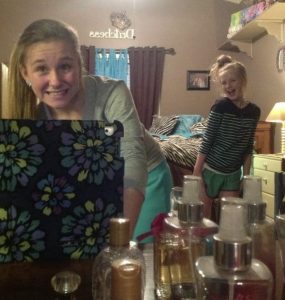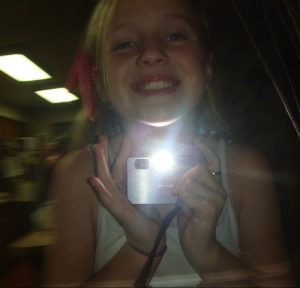20 Media Literacy and Gen Z
By Alyssa Riley

As a Gen Zer growing up since the turn of the 21st century, I have witnessed the technological evolution of many media devices and platforms.
The first iPod hit the market before I was 10 years old, but despite my pleas, it wasn’t until the release of the iPod Nano that my parents caved in. When e-readers became available, it wasn’t long before my parents gifted me a Nook for Christmas, even though I was fearful that print books would soon become extinct. Additionally, because I wasn’t allowed a cellphone until I was 13 years old, I regularly utilized digital cameras and my friends’ iPads for photos and videos.

Today, advances in AI and the metaverse seem inevitable but risk damaging the credibility of mass media content.
Media literacy should refer to more than the ability to read and write, especially as daily conversations are steeped in topics about who posted what on social media, which public official used an offensive term, or what’s the most recent viral TikTok video.
This brief chapter explores the concept of media literacy with an emphasis on Generation Z.
YOUR MEDIA LANDSCAPE
In your personal media usage, do you ever sense that you become more like a lab rat than an independent-thinking consumer? If so, when does that happen, and what media habits could or should you change?
WHAT IS MEDIA LITERACY?
Because media consumption has become integral to our daily lives, it shapes our beliefs, attitudes, values and identity. Additionally, media content entertains, informs, and engages users – both in negative and positive ways. Better understanding the effects of our media usage is integral to media literacy, something that is learned and mindfully grown.
Most definitions of media literacy focus on our ability to access and analyze media messages. For media professionals, media literacy also includes creating and sharing messages in a manner that promotes “independent thinking, authentic dialogue, collaboration, reflection, creativity, and social responsibility.”
Before diving further into the ins and outs of media literacy, watch the following introductory video from CrashCourse.
The importance and concepts of media literacy are constantly expanding. Therefore, it is crucial that we, as media users, sharers and creators, are able to understand and practice it.
Click through the following slideshow to learn more about the concepts of media literacy:
MEDIA LITERACY EDUCATION
As with traditional subjects like mathematics, history, English, and science, media literacy involves skills that we must learn and practice if we want to keep up with emerging research and evolving technology.
The organization Media Literacy Now stresses the need for enhanced education and skills training before students arrive at college.
The ability to navigate within our complex and ever-changing media landscape depends on acquiring skills and tools to know how to consume and evaluate information, ask critical questions, avoid manipulation, and engage in digital spaces safely and confidently. Unfortunately, these skills are not widely taught to our young people – yet.
The idea of actively practicing media literacy may seem vague or daunting. Thankfully, there are resources that aid in decoding, analyzing, and practicing media literacy.
According to Ithaca College’s Project Look Sharp, there are nine categories for decoding media, regardless of form, message, or platform. Click through the following slideshow about ways to decode media through questions to ask yourself:
You can study more from Project Look Sharp’s objectives of media literacy for students.
MEDIA PLATFORMS
The term media can encompass digital, print, audio, video, social media and a variety of interactive content. Advertising is included as well. This makes it impossible to create a one-size-fits-all approach to media literacy, as the following perspective from the Center for Media Literacy suggests:
Although some groups urge families to just turn the TV off, the fact is, media are so ingrained in our cultural milieu that even if you turn off the set, you still cannot escape today’s media culture. Media no longer just influence our culture. They ARE our culture.
Similarly for Gen Z, media literacy isn’t as simple as unsubscribing from social media platforms.
We have covered numerous mass media platforms in this OER text, including social media, books, the Internet, magazines, movies, newspapers, radio, and television. It is important to understand the evolution of these platforms and how they function today so that we are can access, analyze, create, reflect, and interact with them.
To learn more about how we, as news consumers, choose our news, watch the following TED education video:
MEDIA LITERACY IN GENERATION Z
Misinformation, disinformation and non-information seem to saturate U.S. mass media, often made worse by AI-generated content. As we explained in Chapter 3, misinformation can simply describe content with mistakes, while disinformation involves content that is deliberately deceptive.
It is often difficult to discern between what is misleading or completely false vs. what is factual and relevant to our lives.
This is especially true on social media platforms, where members of Gen Z (and other generations) are more susceptible to believing information from content with high engagement levels, such as likes, shares and comments. Most Gen Zers do not consume news from traditional media outlets that are generally deemed more credible.
This begs the question, how can we teach Gen Z a better kind of media literacy?
In Pacific Standard, Sam Wineburg wrote that young people’s Internet navigation abilities can be summed up with one word: bleak. Although Gen Zers are fluent in social media usage, Wineburg said that “over 30 percent thought a fake news post was more trustworthy than a verified one.”
He suggests several useful tactics for how members of Gen Z can increase their media literacy, which are detailed in the content below.
Additional Source – WHAT Is Media Literacy and HOW Can Simple Shifts Center It – PBS
OVERCOMING DEEP DOUBT
Members of Gen Z navigate a media landscape that could be called the Era of Deep Doubt, according to one Wired magazine essay. Due to the rapid growth of media manipulation and AI-generated content, “people can now more credibly claim that real events did not happen and suggest that documentary evidence was fabricated using AI tools.” This makes media-literacy skills more important than ever.
Ultimately, our trust in what we see or read depends on how much we trust the source.
MEDIA CONSUMPTION ASSIGNMENT
First, view the following video from writer and philosopher Jared Henderson. The video includes his advice on how to focus on things we care about.
Next, reflect on your own media habits based on these questions:
- Do you agree with the Henderson’s perspectives about how and why we amuse ourselves to death? Based on content in this chapter and throughout this OER text, do you think this is more prevalent for Gen Z, or does it apply equally to everyone?
- What benefits do you derive from media consumption?
- In what ways, if any, does your media consumption hinder your personal productivity? Is this common to your generation or more universal?
- How do you think your media consumption affects your personal viewpoints?
- To what extent do you intentionally try to increase your media literacy on a regular basis?
Use specific examples when possible to support your reflection, and when possible refer briefly to content from this chapter or elsewhere in this OER text.
Write approximately 250 words. Use journalistic style with no more than three or four sentences per paragraph.
You have the option to use a Q&A format for the bulleted items above with approximately three or four sentences per response.

